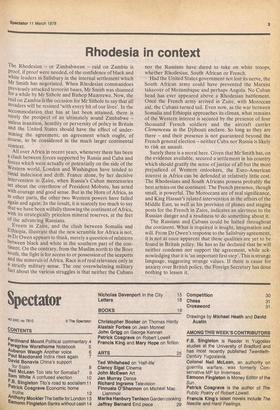Rhodesia in context
The Rhodesian — or Zimbabwean — raid on Zambia is Proof, if proof were needed, of the confidence of black and White leaders in Salisbury in the internal settlement which Mr Smith has negotiated. When Rhodesian commandoes Previously attacked terrorist bases, Mr Smith was shunned for a while by Mr Sithole and Bishop Muzorewa. Now, the raid on Zambia is the occasion for Mr Sithole to say that all invaders will be resisted 'with every bit of our lives'. In the accommodation that has at last been attained, there is surely the prospect of an ultimately sound Zimbabwe — unless inanition, hostility or perversity of policy in Britain and the United States should have the effect of undermining the agreement, an agreement which ought, of course, to be considered in the much larger continental context.
All over Africa in recent years, whenever there has been a clash between forces supported by Russia and Cuba and forces which were actually or potentially on the side of the Western world, London and Washington have tended to timid indecision and drift. France alone, by her decisive intervention in Zaire, when Russia's Cuban mercenaries set about the overthrow of President Mobutu, has acted With courage and good sense. But in the Horn of Africa, as in other parts, the other two Western powers have failed again and again. In the result, it is scarcely too much to say that we have been wilfully throwing the continent of Africa, With its strategically priceless mineral reserves, at the feet of the advancing Russians. Events in Zaire, and the clash between Somalia and Ethiopia, illustrate that the new scramble for Africa is not, as Dr Owen appears to think, merely a question of relations between black and white in the southern part of the continent. On the contrary, from the Muslim north to the Boer south, the fight is for access to or possession of the seaports and the minerals of Africa. Race is of real relevance only in a strictly military sense. The one overwhelming military fact about the various struggles is that neither the Cubans nor the Russians have dared to take on white troops, whether Rhodesian, South African or French.
Had the United States government not lost its nerve, the South African army could have prevented the Marxist takeover of Mozambique and perhaps Angola. No Cuban head has ever appeared above a Rhodesian battlement. Once the French army arrived in Zaire, with Moroccan aid, the Cubans turned tail. Even now, as the war between Somalia and Ethiopia approaches its climax, what remains of the Western interest is secured by the presence of four thousand French soldiers and the aircraft carrier Clemenceau in the Djibouti enclave. So long as they are there — and their presence is not guaranteed beyond the French general election — neither Cuba nor Russia is likely to risk an assault.
Surely there is a moral here. Given that Mr Smith has, on the evidence available, secured a settlement in his country which should gratify the sense of justice of all but the most prejudiced of Western onlookers, the Euro-American interest in Africa can be defended at relatively little cost. The Rhodesians and South Africans possess probably the best armies on the continent. The French presence, though small, is powerful. The Moroccans are of real significance, and King Hassan's related intervention in the affairs of the Middle East, as well as his provision of planes and staging posts for the French in Zaire, indicates an alertness to the Russian danger and a readiness to do something about it.
The Russians and Cubans could be halted throughout the continent. What is required is insight, imagination and will. From Dr Owen's response to the Salisbury agreement, it is not at once apparent that these qualities are yet to be found in British policy. He has so far declared that he will neither condemn nor support the agreement, while acknowledging that it is 'an important first step'. This is strange language, suggesting strange values. If there is cause for anxiety over British policy, the Foreign Secretary has done nothing to lessen it.


































 Previous page
Previous page